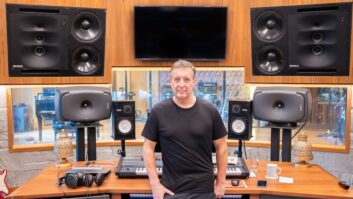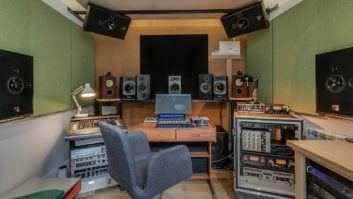Back in the mid-’90s, while we here in the U.S. were still content to pick at the decaying corpse of post-Cobain alt-rock, our European counterparts were gorging themselves on Brit pop’s high-calorie diet of bombast, back-stabbing and public feuds. Bands like Blur, Suede, Oasis and, in purely aesthetic sense, Elastica, preached a cliched gospel of straight-ahead sex, drugs and rock ‘n’ roll to millions of eager fans. Stepping out of this scene of lager-soaked lust (and considered by most to be the anti-Brit pop band) was Placebo, who scored a Top 20 hit in the UK with the track “Nancy Boy” — an infectious ode to androgyny and ambiguity that caught everyone’s attention. Other singles from the band’s self-titled debut, such as “Bruise Pristine,” were also well received, and by year’s end, Placebo, with their flippant, wire-thin, gender-bending frontman Brian Molko, had arrived, and, arguably, things have not been the same since.
Following the band’s initial success, they were asked to join David Bowie at his 50th birthday bash in New York (a friendship that has led to several collaborations), they appeared in the Michael Stipe-produced film Velvet Goldmine, released their critically acclaimed sophomore effort Without You I’m Nothing, which included the U.S. radio hit “Pure Morning,” and embarked on a now infamous, five-continent world tour that helped earn Placebo the title of “the filthiest band in Britain.” Enough said.
Once the tour for Without You I’m Nothing ended in the fall of ’99 and after a much-needed month off, Placebo — which consists of vocalist/guitarist Molko, bassist/guitarist Stefan Olsdal and drummer Steve Hewitt — jumped right back in to the studio to work on their latest release Black Market Music.
Initially released last fall in Europe, where it debuted in the Top 10 (opening at Number One in France and Greece), Black Market Music is Placebo born anew. Where their self-titled debut album seemed somewhat naïve and Without You I’m Nothing lurked dangerously close to sounding over-produced, Black Market Music is a carefully crafted combination of obvious performance-driven energy and top-shelf production that shows the band really hitting their stride both musically and thematically. The opening track, “Taste in Men,” feels like a fully realized cross between Black Celebration-era Depeche Mode and Sonic Youth’s Trash and No Star, and that same tense and infectious mood comes across in a dozen different ways throughout Black Market Music.
A veteran of albums with The Cure and Nick Cave, producer/engineer Paul Corkett was approached by Placebo in the fall of ’99 to possibly work on their new album. “I met Placebo engineering on their second album [Without You I’m Nothing],” Corkett recalls, “but I had to leave the project to start The Cure album [Bloodflowers]. But we hit it off. We had been getting sounds that we liked. And then in the autumn, they came to us and wanted to do an album but didn’t want to necessarily name a producer. They wanted a lot of control and input. And because we’d worked well together, I suggested that we try something. The band went in to write, and while they were writing, we did some b-sides for the fan club sampler. Everything was working, so we decided to pursue it.”
The band set up at a small demo studio in London called Matrix Studios. The modest facility had a Soundcraft board, a 24-track recorder, and a performance area where the band was able to set up and write. “The guys could have live wedges set up,” Corkett continues, “so they all had their own fold-back and were playing without headphones. They could communicate really easily, because it was just like playing live. And they felt it was a really good way to write. So they built a good wealth of material in Matrix Studios, and I kept going up there every three weeks, helping them out with sounds and hearing what they’d done. I was able to be objective about it, and they could tell me where they wanted to push songs.”
“We were dying to get in the studio,” drummer Hewitt adds. “We really didn’t have too much time to write new stuff on tour. So we came off the road and had two tracks, and then we went into Matrix, the place where we wrote Without You I’m Nothing. And you can just get in there and play and record. We got in there and let it all go.
“When we’re writing, the music always comes first,” Hewitt continues. “We’re always knocking tunes around. We’re always trying different things, like loops and various keyboard and guitar parts. And then Brian [Molko] tries to set lyrics around what’s going on. On occasion, like on ‘Special K,’ the song will start with just vocals and guitar. The majority of it, though, is just music, grooves, bass parts, and guitar and keyboard parts. And we’ll just piece it all together. None of us have defined roles in the studio. So we all play different things. But Brian and Stef [Olsdal] can’t play drums that well, and I can’t play guitar that well. [Laughs.] But we mix and match, and everybody’s got their hands on everything.”
The band spent three months at Matrix writing and recording. Two of the songs they tracked there, “Peeping Tom” and “Blue American,” ended up being mastered and were included on the album. Corkett then joined the band full time at Olympic Studios, also in London, where they all went about the task of re-recording the material they had begun at Matrix. The band moved into Olympic’s Studio 2, which houses a 56-channel SSL 4000.
“Once we arrived at Olympic,” Corkett explains, “we set up a sound space where the band could really communicate with each other, visually and playing-wise. We had the amps separated, in the sense that both Brian and Stef had matching rigs. So sometimes Brian would play six-string bass. Other times, Stef would be playing the rhythm guitar part, and that’s how they work; they alternate parts a lot.”
The guitar amps were normally miked with Shure SM57s up close and then Neumann U67s set back a few feet. Corkett also tracked direct lines into Pro Tools, allowing either him or the band to later add extra processing to a particular track. The band themselves also manipulated a lot of sounds at the source with various pedals and combinations of guitars.
For tracking the drums, Corkett set Hewitt up on a riser in order to capture more bottom end and to produce some better resonance. “It really projected the sound straight out into the room,” Corkett says. “The bass drum ambience was really nice to deal with. It also gave Steve a sense of how they normally set up when they’re playing live.”
Corkett and Hewitt also set up, as they put it, a mono “trash kit,” which was a very minimal drum kit set up to the side of the regular kit and miked with a handful of dynamic and room mics. This simply provided an alternative sound to the normal kit and actually ended up on the track “Song for Levi.” Corkett miked the regular drum kit with a Neumann U47 on bass drum; an SM57 on snare top; Sennheiser 421s on the toms; Neumann KM84s on overheads and hi-hat; and a pair of 87s further back to capture the sound of the room. Above Hewitt’s head, Corkett also set up an 87, which was run through an 1176 gained up at different ratios to produce what Corkett calls “a very chewed, compressed sound.”
“I kind of had a clean and a driven sound, and I would play the different sounds to the band,” Corkett states. “And then we’d narrow it down to the song. Maybe on one mix of ‘Slave to the Wage,’ I might have supported the snare with a sample, but it’s still all live kit. We spent the time and got the sounds we wanted.”
For Molko’s vocals, Corkett, after trying a number of other mics, including an M149, generally used the same A-T 4055 that Molko uses on the road. Beyond that, the vocal tracks were an exercise in simplicity. “With Brian,” Corkett says, “he doesn’t need any effects to sing to. He likes his vocal pretty dry most of the time, so it’s just his voice, very unflattered. That way, he knows where he’s at. He’s a very quick singer. Once he’s got his lyrics nailed, it’s within three performances — that’s it. If there is a particular part of a song that’s not coming together, he will then work on it. But, generally, he prefers to do live takes, and most of the time we’ll just take a live take and patch a couple of elements.
“And then I just use gentle compression on his voice,” he continues. “He doesn’t like it to be squashed, because if he wants to open up, he doesn’t want to be held back. But he’s a very easy vocalist to work with. He can switch it on at any time of the day — just ask him. But if it’s a sensitive song, he’ll say when he wants to do it, which is cool. And as soon as we were set up [at Olympic], it was like, ‘If you feel like a vocal, you do one. It doesn’t matter if the track is really raw; we’ve only got drums, bass and the chords down. If you’re ready to do a vocal, let’s do it!’ And he could just whack a vocal down and listen to it, and mainly it was just to verify his lyrics and then build the angle of how he was going to do the performance.”
Brian doesn’t need any effects to sing to. He likes his vocal pretty dry most of the time, so it’s just his voice, very unflattered…Then I just use gentle compression on his voice.
— Paul Corkett
In addition to a number of straight-ahead drum/guitar/bass songs, several of the tracks off Black Market Music, and some b-side offerings, like “Little Mo,” incorporate a good deal of synths and keyboard lines. For these elements, Corkett set Molko and Olsdal (who both play keyboards live) up with some small Yamaha keyboards and a generous supply of effect units.
“The band never use presets. They’ll chain [their keyboards] through a variety of effects and add what they like until they get a sound that sparks them. And, in doing that, they generate much more original sounds and off-the-cuff stuff. They can be things like Electro-Harmonix pedals and envelope filters. We recorded all the keyboards live; there was no MIDI information, and then we would just compile them, which was a very straightforward process.”
Other musicians who were brought in on the project included rapper Justin Warfield of One-inch Punch, who contributed vocals to the track “Spite and Malice”; Brian Ellis of PJ Harvey’s band, who handled the string arrangement on the album’s secret track “Black Market Blood”; and Linoleum singer Severe Loren added backing tracks to both “Taste in Men” and “Special K.” According to Corkett, “It turned out to be really nice to involve someone else, vocally, on the album.”
“They wanted this record not to be so polished,” Corkett concludes. “They wanted a rawer sound that may occasionally require some polish. They’re fans of Sonic Youth, so they love that kind of garage thing you can sometimes get, but they were looking for a more controllable version of that. And really nothing about this album was a pain. I think we mixed ‘Special K’ twice. But we would mix tracks when we felt ready to mix them, which is really a luxurious position to have, not having the pressure of ‘shit, this has got to be done!’ Nothing ever became a chore. It was always fresh. And they’re a very inspiring band to work with. They never treat it like a chore. They just get off on the energy and the music, which is really nice to be involved in.”






